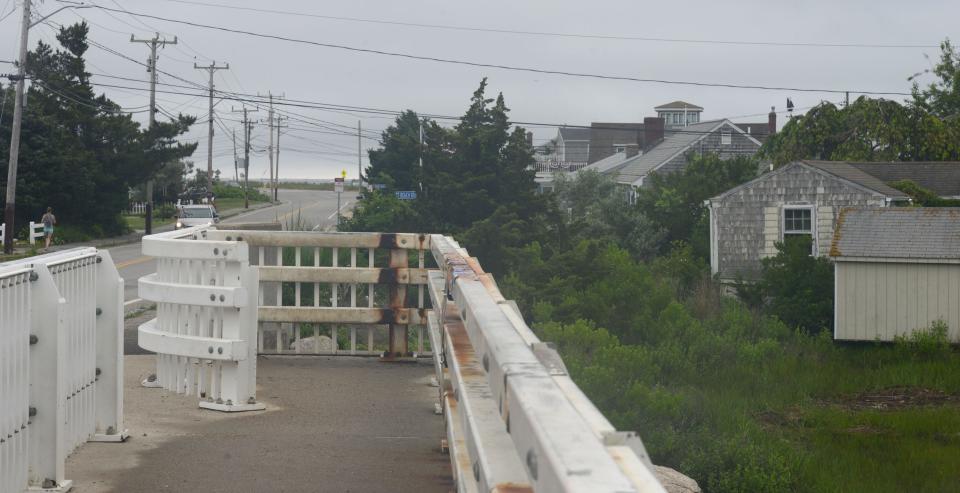Barnstable conservation board poised to OK Park City Wind plan to bring cables ashore
While they have yet to vote formally, members of the Barnstable Conservation Commission have indicated they are prepared to approve Avangrid Renewables' proposal to bring power cables from its Park City Wind project ashore at Craigville Beach and run them under the Centerville River.
Commission Chair Tom Lee conducted a straw poll on the plan during the board's online meeting Tuesday, with members giving it unanimous preliminary support. An official vote is expected no later than Oct. 17, pending completion of an order of conditions.
The panel on Sept. 12 closed a public hearing on the offshore wind developer's proposal and took it under advisement while conditions were drafted. On Tuesday, Lee presented a list of 13 conditions that the board spent about an hour discussing. The board decided to extend the advisement period through Oct. 17 in order to further hone the conditions based on the comment from members.

The board acknowledged the questions residents have raised — including the project's financial viability, what safeguards are in place if the project falters and whether it may harm marine life, and how it could affect the environment further inland at power substations. Board members repeated previous statements about the limits of their jurisdiction.
"We need to focus and limit ourselves to what's within our jurisdiction, and, given that, I feel this a project I would approve," said board Vice Chair Louise Foster.
Limits to what the Conservation Commission can do
Member John Abodeely said residents have aired "legitimate concerns," but also stressed "we have no legal authority" to address many of them. He suggested other boards could consider those concerns.
Avangrid is specifically seeking permits to bring two 275-kV submarine electric transmission cables from its 804-megawatt offshore wind farm ashore at the west end of Craigville Beach by way of horizontal directional drilling — a technique used to bring power cables from the Vineyard Wind project ashore at Covell Beach.
The company is looking to pass the power cables under the beach, then under the Centerville River at 2 Short Beach Road, which was purchased the end of June for $430,000, according to town assessing records. Plans call for conveying the cables under the river using microtunneling — a trenchless construction technique. After that, the cables would be routed underground about four miles to a proposed substation on Shootflying Hill Road, then nearly a mile to the existing Eversource substation on Oak Street in West Barnstable. From there the project would connect with the ISO-NE electrical grid.
Avangrid has a contract to provide Connecticut with the power Park City Wind will generate.
Among the Conservation Commission's draft conditions are limitations on when the company can conduct work. Horizontal directional drilling can't be done between April 1 and Aug. 31, and microtunneling can't be conducted from mid-May to Sept. 30. The dates will be firmed up in the final version of the order of conditions.
Worries over electromagnetic fields
The board is also looking to require that the cables be tunneled at least 10 feet below the bottom of the river to minimize any electromagnetic fields, or EMFs, the cables may produce. Other conditions call for pre-construction site meetings, compliance with state natural heritage guidelines, and close monitoring of all drilling.
The condition that got the most discussion Tuesday calls for regular monitoring for excessive EMF levels at specific locations — including on the beach, and entry and exit points at the river — for at least three years. Residents are worried about how EMFs could affect people and the river ecosystem at a hearing earlier this month.
During that hearing, Chris Long, an expert in exposure and risk assessment from Gradient Corp, which is working with Avangrid, addressed EMF concerns. He said putting the lines 10 feet or deeper underground, as is proposed, "would make the effects of the EMF negligible." Further, he said, placing conduits in close proximity to others "cancels" the magnetic fields.
On Tuesday, Conservation Commission member Peter Sampou agreed the board should require EMF monitoring. If at any time it exceeds industry standards, "the applicant would be required to submit remediation for conservation approval," he said.
Electromagnetic fields monitoring for life of project proposed
Charles McLaughlin, an attorney for the town, suggested requiring regular monitoring for the life of the project, especially considering how rough a marine environment can be. Even if it's unlikely to be a problem, he cited case law that emphasizes planning for the potential for a problem.
"At the end of the day, the concern from our perspective is you've got to take into consideration what the risk is, and we have to mitigate it," he said. "And I think that's what you're doing."
Board member William Hearn agreed monitoring needs to be included among the conditions.
"No, we don't think things are going to go sideways," he said, stressing no problems are expected and the risk is slight, but there should be a process for monitoring and addressing it, just in case.
Heather McCarron writes about climate change, environment, energy, science and the natural world. Reach her at hmccarron@capecodonline.com.
Thanks to our subscribers, who help make this coverage possible. If you are not a subscriber, please consider supporting quality local journalism with a Cape Cod Times subscription. Here are our subscription plans.
This article originally appeared on Cape Cod Times: Electromagnetic fields a worry: Park City Wind OK nears in Barnstable

